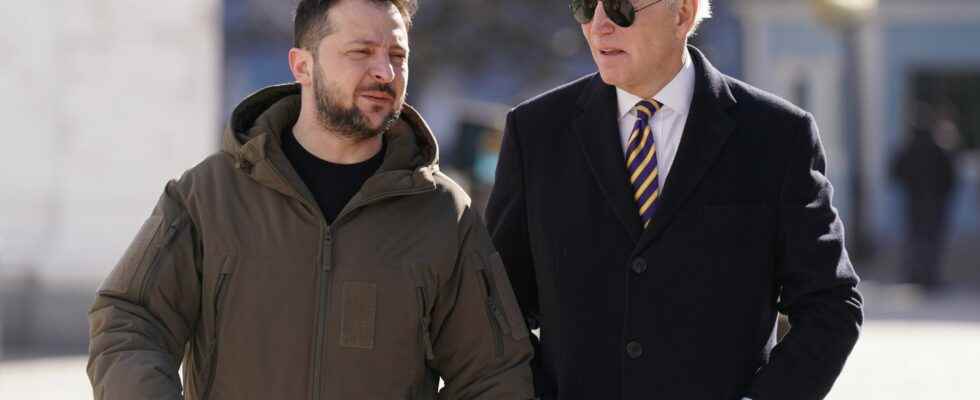On a visit this Friday to Kiev on the occasion of the first anniversary of the war in Ukraine, the Polish Prime Minister, Mateusz Morawiecki, announced the arrival of the first four Leopard 2 combat tanks, out of the fourteen that his government has promised to deliver to the Ukrainian army. He also said that Poland was ready to train pilots on US F-16 fighter jets. But Joe Biden tempered this announcement, confiding in the ABC News channel that Washington was not planning, “for now”, to deliver such weapons to kyiv. “Ukraine needs tanks, artillery, air defense”, listed Joe Biden, but “according to our army, there is no element justifying the sending of F-16” .
Interviewed by RFI, the former colonel of the Marines Mark Cancian qualified the importance of this refusal on the continuation of the war in Ukraine. “Training the Ukrainians to use the F-16s will take at least a year, maybe more. Especially for maintenance, to set up a logistics chain. Also, the F-16s are very expensive, they cost 100 million dollars a piece and are very vulnerable when they are on the ground.”
Lukashenko will visit China next week, Macron “early April”
The President of Belarus, Alexander Lukashenko, will travel to China from Tuesday to next Thursday for an official visit, announced this Saturday, February 25, the Chinese Ministry of Foreign Affairs. A close ally of Putin, Lukashenko had, in September 2022, signed a strategic partnership with Beijing, during a summit held in Uzbekistan.
For several weeks, China has been trying to play a role of mediator in the Russian-Ukrainian conflict. This Friday, several hours after her abstention at the United Nations General Assembly on the resolution asking Russia to withdraw its troops from Ukraine, she proposed a peace plan between the two countries. In this document, Beijing takes a stand against any recourse to nuclear weapons, asks the belligerents not to attack civilians and urges them to establish a dialogue.
An initiative rejected by Volodymyr Zelensky, who nevertheless took the opportunity to express his intention to “meet Xi Jinping”. Russia, for its part, said it “appreciated” China’s efforts, while insisting on the need for any peace plan to recognize as Russian the four Ukrainian regions annexed last September by Moscow. For his part, Emmanuel Macron announced this Saturday that he would go to China “at the beginning of April”, calling on Beijing to “help us put pressure on Russia” in order to “stop the aggression” and “build peace”.
Kazakhstan comes out in favor of the Chinese peace plan
This Saturday, Kazakhstan, a vast Central Asian country allied with Russia which has so far maintained a balanced position on the Russian-Ukrainian conflict, said it supported the peace proposal unveiled by China on Friday.. The country “positively welcomes the position of the People’s Republic of China”, Kazakh diplomacy said in a statement. This position comes a few days before the first visit of the American Secretary of State, Antony Blinken, to Central Asia, to strengthen Washington’s ties with the five former Soviet republics in the region.
European Union approves new sanctions against Russia
This Friday, on the occasion of the first anniversary of the invasion of Ukraine by Russia, the member countries of the European Union agreed to adopt a new set of sanctions against Moscow. This tenth sanctions package includes even tighter restrictions on technology exports, new constraints on people and entities who support the war, and measures against Russian disinformation.
At the end of the evening, Poland lifted its reservations and voted on the content, without obtaining the toughening of the sanctions which it nevertheless demanded. During his visit to kyiv, the Polish Prime Minister felt that this tenth package of sanctions was “too soft, too weak”.
Lula offers to mediate the conflict
Brazilian President Luiz Inacio Lula da Silva reaffirmed on Friday his intention to form a group of countries that would work towards peace negotiations between Russia and Ukraine. “There is an urgent need for a group of countries not involved in the conflict to take responsibility for restoring peace,” he tweeted. Lula had already mentioned this idea after a meeting with the German Chancellor, Olaf Scholz, on January 30 in Brasilia.
Russian Deputy Foreign Minister Mikhail Galouzin assured in an interview with the Russian news agency TASS that Moscow was studying this proposal, “especially because of Brazil’s balanced position”. The links between Lula and Putin are known, and they were confirmed when the Brazilian president recently refused to send ammunition to Ukraine.
